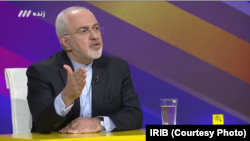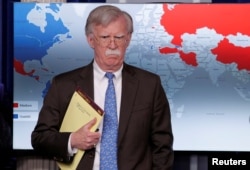Iranian Foreign Minister Mohammad Javad Zarif is accusing the United States of trying to "bring Iran to its knees" and overthrow its government by seeking to thwart its international oil trade.
Zarif, in an interview broadcast on the U.S. cable show Fox News Sunday, said a "B team" of Israeli Prime Minister Benjamin Netanyahu, U.S. national security adviser John Bolton, and leaders in Saudi Arabia and the United Arab Emirates is trying to push U.S. President Donald Trump "into a confrontation he doesn't want."
"They have tried to bring the U.S. into a war," Zarif said, with the goal, "at least," of Iranian regime change.
Bolton, appearing on the same Fox News program, said the U.S. goal is not regime change, but a change in behavior, specifically an end to Iran's nuclear weapons program and ballistic missile testing.
"The Iranian people deserve a better government," Bolton said.
He called Zarif's accusations "completely ridiculous, an effort to sow disinformation."
The United States recently declared Iran's Islamic Revolutionary Guards Corps a terrorist organization and says on Thursday it will end waivers of sanctions for all countries buying Iranian crude oil, including China, India, Japan, Turkey and South Korea, which had continued to buy from Tehran since last year when new U.S. sanctions against Iran were imposed.
The United States says it wants to deprive Iran of $50 billion in annual oil revenues to pressure it to end its nuclear and missile programs. The White House says it is working with top oil exporters Saudi Arabia and the UAE to ensure an adequate world oil supply.
But it is uncertain how effective the U.S. end of waivers to the sanctions on countries trading with Iran will prove to be. Turkey and China have attacked the U.S. action, but it is not clear whether they will continue to buy Iranian oil.
Zarif said the goal of the sanctions is to "put as much pressure on the Iranian people as possible so they will take action" against the Iranian government. Zarif said U.S. officials are "wrong, their hope and delusion."
He said the fact that Trump withdrew the United States from the 2015 international agreement to curtail Iran's nuclear program "would not put the U.S. in the good list of law-abiding nations." Iran state media reported that Zarif told Iranian reporters in New York that Tehran's withdrawal from the pact is one of "many options" it is considering in the wake of the U.S. end to the waivers on sanctions for countries buying oil from Iran.
Zarif said the U.S. withdrawal from the nuclear pact shows the Iranian people that "engagement does not have dividends. They should not trust the signature of the president of the United States," referring to former President Barack Obama, whose push for the international pact was overturned by Trump.





